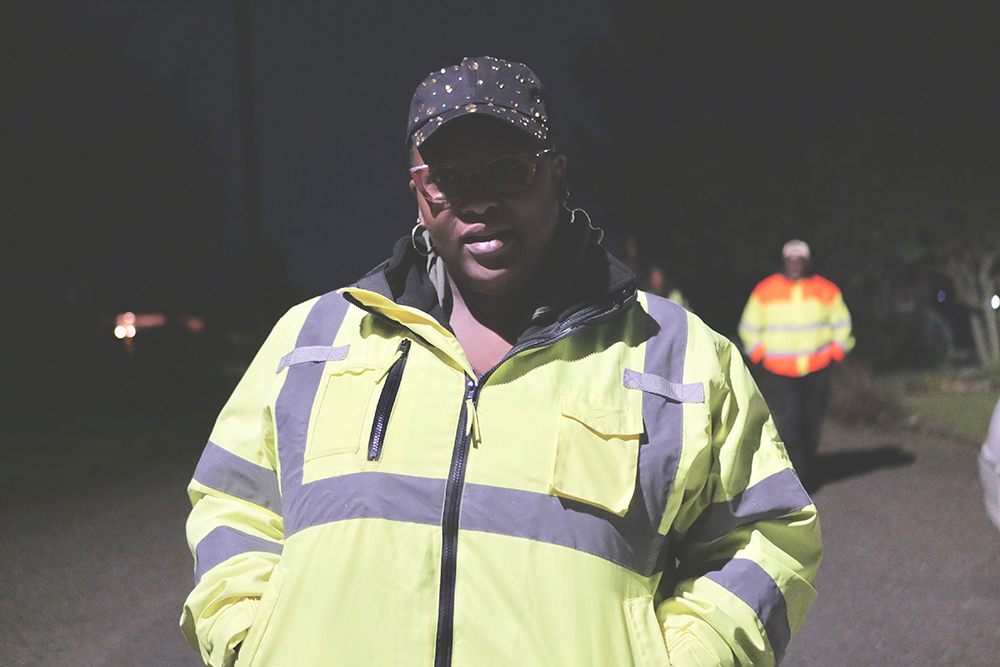As coronavirus continues to disrupt daily life, anti-gun violence advocates worry the communities hit hardest will see spikes in shootings.
Onoyemi Williams, a former parole officer and activist in Birmingham, says Alabama’s working-class and predominately African-American neighborhoods need better support.
She works as a health insurance analyst and is the mother of three teenagers (two biological, one foster) in Smithfield, a neighborhood on Birmingham’s west side, where the majority of the city’s homicides take place. Four years ago, Williams began to organize around violence reduction. She connected with Faith in Action, a national network of faith organizations addressing injustice. Nearly 60 houses of worship — from synagogues to strip mall churches — represent the Birmingham chapter. Williams jokingly calls herself the good heathen of the bunch. She’s also the only woman.
Leaning on the lessons she learned during her 14-year tenure as a parole officer in her homestate, Florida, Williams co-chairs weekly “peace walks,” where the ministers and Williams go door to door, talking to residents with a simple goal: “Listen, love, learn.” The “peacemakers” of Faith In Action say the group has seen success in reducing violence.
To end the violence, Faith in Action is working on such programs as job training, drug and alcohol rehabilitation and grief counseling to prevent retaliatory killings.
But now, most of that is on hold. Williams is working to help African Americans, who are disproportionately dying of COVID-19, to access the resources they need while sheltering in place.
Williams talked about the risks in working-class, African American neighborhoods during the coronavirus pandemic. Here’s an edited version of the conversation:
Webb-Hehn:
What problems is Faith in Action seeing in low-income communities right now?
Williams:
You’ve got to understand the population affected by gun violence is the same population that's disproportionately being affected by the coronavirus.
Right now, we can't go door to door because we don't have street outreach workers. And the community doesn't have the PPE [personal protective equipment].
People forget a lot of your service workers come from the low-income community. They’re still going to work in the grocery stores, as the janitors, but they don't have PPE. Just like they didn't have the funds to run out and buy up all the toilet paper, they couldn’t go out and get the masks before the masks became scarce.
[Related: Coronavirus Produces School Closures, Uncertain Futures, Extra Stress for Alabama Teens]
[Related: How to Help Struggling Kids During Coronavirus]
Then the ones who aren't working every day don't have the financial resources to be able to buy this stuff because they've lost their jobs. Now we're a month out from the last time they received a paycheck. Many are still waiting in line to file for their unemployment. Because all the libraries are shut down, they don't have the internet connection to be able to easily file.
It’s just a huge disparity and an equity issue.
Webb-Hehn:
How does that connect to gun violence reduction?
Williams:
I’ll say it again. Those affected by gun violence are the same population disproportionately affected by COVID-19, and now the same population being overlooked as the relief opportunities are being presented. We’re handing out food, but not making sure students have access to the internet to do their schoolwork, not making sure this community knows about job opportunities. We say, “All we have to do is throw you crumbs, and you're supposed to be able to survive and come up off of the crumbs.”
They're living in these communities and have nothing to do. You have nothing but a whole bunch of idle time, nowhere to go. And now you have teenagers with nowhere to go, nothing to do, nothing to occupy your time.
They were already living in a stressful situation. Their stress is just being compounded.
Guess what they're doing. They're picking fights.
As we continue to go through this, we expect to see violence hit. We're expecting a big uptick.
Webb-Hehn:
How are teenagers, in particular, impacted by this stress? Are they at higher risk for violence?
Williams:
Everybody is on edge. Tempers are on edge. Just living in crappy living quarters, it's very hard to social distance. Most of your entryways in public housing spaces are less than six feet apart. The stoops are four feet apart. You can’t even sit outside.
Mom is up under a lot of stress so you know, she ain't got a whole lot of time to be gentle with you. If parents are working, some grandparents might check on kids but a lot aren’t because of fear. They don’t want to get sick and die.
And with young men, maybe grandparents were supported by them or offered support. Now they're too afraid to even go to their house to get food. They don’t want to get them sick. So, where do they go?
This story was produced in conjunction with The Anniston Star. It is part of the Juvenile Justice Information Exchange’s project on targeting gun violence. Support is provided by The Kendeda Fund. Youth Today is solely responsible for the content and maintains editorial independence.
